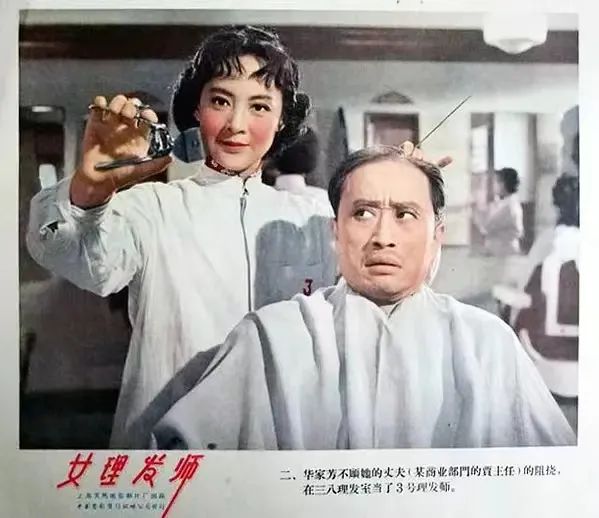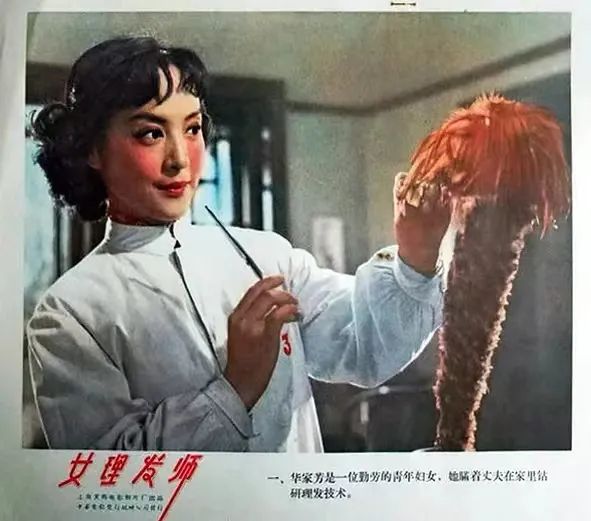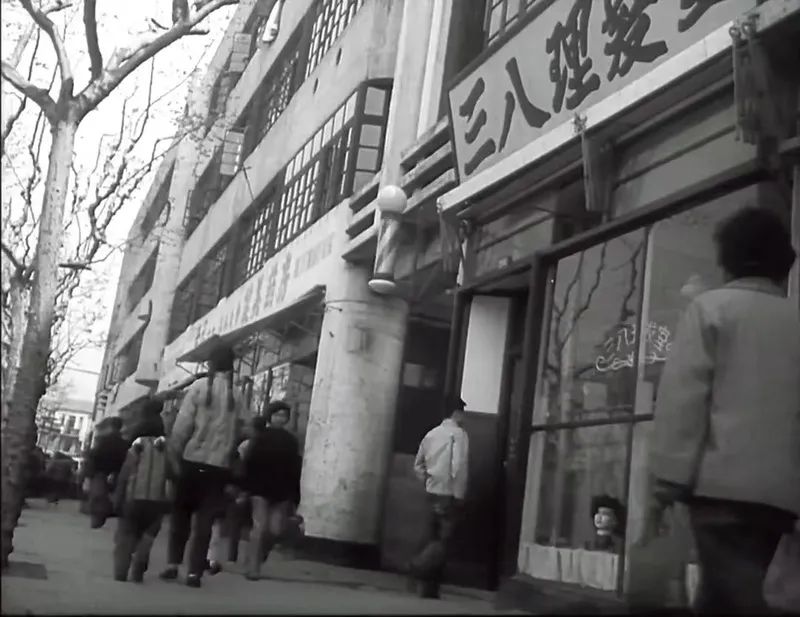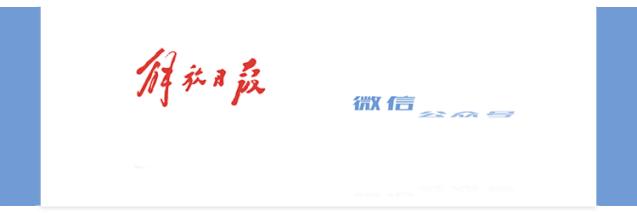Red Rose Beauty Salon Previous Life: "Female Female Family" Wang Danfeng and "March 8th Fair Room" | Share before bedtime
Author:Jiefang Daily Time:2022.08.20

1
In the beginning of 1961, Shanghai's famous Nanjing Barber company newly came to a "female manager".
It is not accurate to say that it is a hairdresser. In fact, at the time, the 37 -year -old woman was just a "apprentice" in the beauty and beauty industry. In Nanjing Barber Company, she worshiped the hairdresser Liu Ruiqing as a teacher, learned the haircut skills, and went to the Barber Training School to live with the female lawmaster and female artists.
Nanjing Barber Company opened in the early 1930s and enjoys a reputation in the minds of old Shanghai, and the technicians in the store gathered. Liu Ruiqing was later known as one of the "Four Famous Dans" by Shanghai's hairdressing industry. He had hot hair and designing hairstyles for the film star Ruan Lingyu and his mother. And this time Master Liu's "teaching" female apprentice is not ordinary. She is the famous actor Wang Danfeng.
It was because in early December 1961, Wang Danfeng began to shoot a film "Female Family Female" adapted from a comedy drama. In the film, she first tried a comedy role and played the heroine's hairdressing Hua Jiafang. The conservative husband and old Jia did not support the original wife Hua Jiafang, who was shaved, and said to his colleague Zhao as a primary school teacher. The wife cut her hair during the hair of Lao Zhao, and the couple made all kinds of jokes.
In just 49 minutes of movies, brisk humor, loyal to record the street images of Shanghai at the time. The "March 8th Development Room" of the Chinese Jiafang work is also well -known in real life, that is, today's "Red Rose Beauty Salon" located in the Huaihai Building.


2
"Firestorm" can reflect a person's spiritual appearance, which is a matter of life for Shanghai people who pay attention to decent.
As early as the beginning of the 19th century, the businessmen of the sixteenth shop of Shanghai City Chamber gathered, the population increased, and the industry gradually formed an industry for shaving, shaving, and braids for people. The earliest batch of shaved masters began to carry bags to get in and out of wealthy people, shaving their heads, braids, and massaging massage. Gradually, the flowing razor began to fixed, and some in the "Changyuan" and "Yiyuan" bathhouse and some tea buildings shaved their heads, braids, and laughed.
Around 1900, some foreign companies began to set up western barber shops in Shanghai. In 1887, three people including McLRRon, France opened the barber shop "Paris Salon" on Nanjing Road 19, and Japanese businessmen opened Village Mountain Hair Store on North Sichuan Road in Hongkou District. In the thirty -two years of Guangxu (1906), the British businessmen were equipped with a barber room at the Huizhong Hotel (now the South Building of Heping Hotel), and all the equipment and supplies were imported. The transformation of Shanghai's "top style".
With the wave of the Revolution of 1911, more than 10,000 people in Shanghai held a haircut conference on Jing'an Temple Road (now Nanjing West Road) and Mathez Road (now Taixing Road). The venue was equipped with a shaved master to cut off his braids on the spot. After the rule of the Qing Dynasty was overthrown, the men generally cut their braids and kept hair, and new barber shops appeared everywhere on the streets and alleys. The former shaving head and braid industry began to develop in the modern barber industry.
At that time, there were earlier barber shops in the urban area including Jiao Yingji Magazine (1911) on the South Road of Tibet (1911), the American Barber Store on Meizhou Road (1912), Shanhaiguan Luyunji White Rose Journey Store (1912), Xia Fei Xinhua and Lihua Richard Store (1913) of the road (now Huaihai Middle Road), and the Taiji Lichenda Store (1913) of Luxiangyuan Road, etc. (1913). The service items include four items such as braids, repair, shaving, shampoo, and the service charges are 2 corners of the braid, 1 angle of hair, 5 points for shaving, and 5 points for shampoo. After the May 4th Movement, women generally cut their hair, and barber shops increased their hair cutting business, so that the barber industry shifted from only to the male guest to the male and female guests at the same time, and gradually extended the business to beauty and nails. ("Shanghai Food Service Industry")
According to the "Shanghai Industry and Commercial Compilation" records, at the time, foreign companies came to Shanghai to open a barber shop and beauty salon to bring Western -style perm, massage, beauty, hairstyle design and other technologies to Shanghai's magic industry. In the fierce competition, the number of barber shops in Shanghai in the 1930s increased by more than double the 1920s and developed to more than 2,000. Among them, there were 200 senior barber shops, which had a considerable scale. The industry's operation level is divided into special, A, B, C, 4, etc., each divided into level 2 levels, 4 levels, and a total of 4 levels.
According to the statistics of the Shanghai Bagiative Business Association in 1946, there were more than 50 barber shops listed in the special -level barber. Among them, Nanjing Barberry Co., Ltd., which was invested by Huang Huayi, the overseas Chinese of the United States, was imported from the United States. The equipment and supplies were all imported from the United States. They hired famous teachers at high prices. They had high technical service quality and became one of the famous special stores in Shanghai.
3
Wang Danfeng's master Liu Ruiqing is a famous technician who has long worked at Nanjing Barber Company for a long time.
Master Liu was born in Yangzhou, Jiangsu. He was born in 1909. At the age of 14, he went to Shanghai to learn technology. At the age of 20, he appeared in the industry. He was not only an honorary specialist in the haircut industry. In 1959, he also visited the Soviet Union, Romania, Romania, Bulgaria, Hungary and other countries were rated as Shanghai model workers. He wrote that he wrote "Cold Scald Technology" and "Liu Ruiqing Hair Selection", providing valuable technical information for the industry, and also changed many young people to change their views of low service industry.
That is, in 1959, Shanghai's barber industry absorbed 1,000 middle school students to participate in the work. In the 1960s, newcomers successively recruited new people to enrich the cultural practitioners for this traditional industry.
The industry is noble and low, and everyone is equal in front of labor; women have to be liberated and go out to work half of the sky. Under the influence of such a fresh style, a housewife's story of a housewife concealed the cadre's husband went to be a female manager. In the article "In Barber Shop", Wang Danfeng records his apprenticeship career:
"Seeing hairdresser Liu Ruiqing and Jin Wanzhang, the noble quality of the two masters of the two masters for the people. They stood for a haircut all the time all day and treated each customer well. , But they have always been so patient without getting tired or troublesome. In the barber shop, I see how people who go in, but it is always glory to step out of the barber shop. I said: 'Seeing customer satisfaction is the highest reward for our work. How many days of the working people are busy, although entering the barber shop is actually a rest. Will be fully put into production with spirit. '"
When the movie was filmed, the red rose beauty salon became a place. The camera shook from the lively Huaihai Road and the streets of Changshu Road in Shanghai. Inside the store, the barber technicians wearing simple white coats cultivated and hairdresser for guests. When Hua Jiafang found that her husband came to patronize, he panicked and dodged, drilled into the perm machine to cover the face, everything seemed witty and full of life.
After the reform and opening up, the perm and other businesses resumed, and the pursuit of the Shanghai people on the state -owned barber shop reached its peak in the 1980s. However, at that time, the hairdresser of the State -owned Foreign Store was busy from morning to night. The salary bonus in January was only 150 to 300 yuan, and a individual hairdressing income was at least 1,000 yuan. The impact of the market economy brings challenges to state -owned barber shops.
However, when the world is easy, many old Shanghai's loyalty to the old name is not affected by external trends. For example, many guests who patronize red roses are decades of retorters.
4
In the movie, the barber shop that Huajiafang works is "March 8th Hair Room", and this is inseparable from the background of the era when Shanghai encourages households to encourage house women to get out of the house.
Screenshot of the Stills of "Female Female Family"

In the early days of liberation, women were generally not educated, and professional women were rare, and housewives were not less than one million. At that time, the main work of the Women's Federation was to go deep into the streets and lanes, encouraged women's literacy, broke the shackles of feudal thoughts and customs, and returned to public labor. To this end, many sewing shops and catering shops with the main purpose of liberating women are established. Many of them are named after "March 8".
For example, there are 38 cafeterias, 38 kinds of kindergartens, three eight -child children, and a state -owned three -eighth food store. Among the more than 30 employees of this diet store, after the establishment of 3/4 and 1959, women have won the glorious title of the municipal patriotic health advanced units for 5 consecutive years, and have been rated as the advanced collective of the 1963 financial trade system. How the waiters in the store provide considerate service and the neat and hygienic cases of tableware have been reported by the media many times.
In the "March 8th Development Room" in the film, most of them are also female manists. The cadre of "Men and Women's Equality", Jia Muming, went to the barber room to have a "No. 3 waiter" haircut. When he found that the star technician was his wife, he was unhappy, but when he saw the respect and seeing his wife's work and seeing, he came to the store. After the interview, the reporter finally recognized the choice of his wife.
Behind the actual existence of the "38 Eight Food Stores" and the "Three Eighth Broken Rooms" that exist in fictional, it is the history of women's liberation history in Shanghai: within 3 years after the liberation of Shanghai, there are more than 40,000 unemployed female workers and families. Women go to production and work.
In the second year after the film was released, Yuan Meirong, a female manager who worked at Nanjing Barber Company, wrote to Wang Danfeng, a "female manager" Wang Danfeng on the report:
"I will tell you one of my most excited things. I have already mastered the haircut technology under the guidance of the party and the teacher's counseling. Now I am full of teachers and go to work. I must listen to the party. I must listen to the party. Serving customers for life. "
And Wang Danfeng wrote in the reply:
"From several of your female manners, I have learned you to fight with the surrounding habit of forces, overcome all kinds of ideological obstacles, become the spirit of the Land of Land, and dedicate to the service industry. I thought added the passion for art creation. "
Liberation Daily · Shangguan News Original manuscript, reprinting without permission
Author: Shen Yilun
WeChat editor: Jia Simin Liu Huiyu
School pair: Xiaochuan

- END -
Build a "safety line"!Zaozhuang High -tech Zone solidly promotes flood prevention work in urban areas
Qilu.com · Lightning News, July 14th. On July 14, the Zaozhuang High -tech Zone was generally raining rain. In order to ensure the safety of traffic traffic, the comprehensive law enforcement bureau
Caohu Township, Wantai County Carry out traffic safety publicity activities

(Xu Meifeng) In order to effectively strengthen the publicity and education of tra...